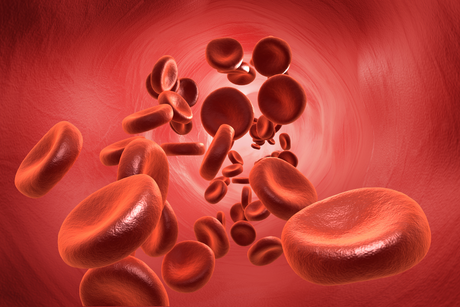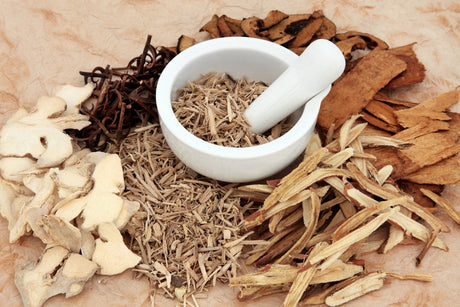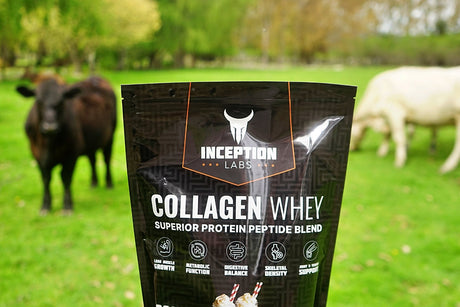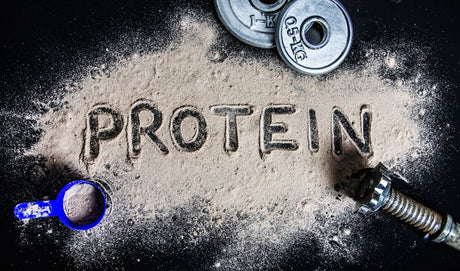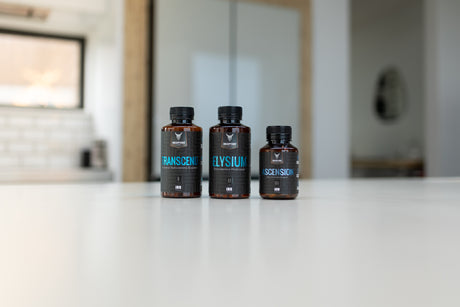Lion's mane is a type of edible fungi prized for its culinary and medicinal properties. This striking fungus gets its name from its furry, cascading white spines, resembling a lion's mane. It can be found growing on dead or dying hardwood trees and is rich in nutrients, including antioxidants, polysaccharides, and terpenoids.
Lion's mane has traditionally been used to boost immune system function, reduce inflammation, and promote digestive health. More recently, this fungus has gained attention for its brain-boosting effects, with several studies finding that compounds in these mushrooms can encourage the growth of new nerve cells and improve cognitive function (Wong, K.H., 2012). Further studies have also ascertained that lion's mane may have promising testosterone-boosting properties.
They are typically consumed in soups, stir-fries, and other culinary dishes or as a dietary supplement. Lion's mane is an excellent addition to any health regimen, providing a wealth of health benefits.
Repairs and improves cognitive function
Nerve growth factor (NGF) is a protein that helps support nerve cells' growth and survival. NGF is essential for the proper development of the nervous system and plays a role in regeneration after injury. NGF interacts with receptors on nerve cells, promoting the survival and growth of these cells. It is also involved in developing new connections between nerve cells, known as synapses. Further to its role in developing and maintaining the nervous system, NGF has anti-inflammatory and analgesic effects. Thus, NGF may have potential therapeutic applications for various conditions, including neurodegenerative diseases and pain. NGF levels decline with age, which may contribute to age-related neurodegenerative disorders (Sabaratnam, V., 2013)
Lion's mane mushrooms are a natural source of NGF, and studies have shown that they can help improve cognitive function and reduce the symptoms of age-related neurological diseases. Lion's mane contains compounds that mimic the structure of NGF, and these compounds can bind to receptors in the brain. This binding helps to stimulate the growth and regeneration of nerve cells, which leads to improved cognitive function.
In several studies lion's mane extract was observed to increase NGF production by over 250% in mouse neurons (Spelman, K., 2017). This suggests that lion's mane extract may be beneficial in treating and reducing cognitive health and neurological conditions such as Alzheimer's disease and Parkinson's disease. Lion's mane extract is safe and well tolerated, making it a promising natural treatment for cognitive decline and neurological disorders.
Supports healthy immune system function
Lion's mane mushrooms have long been revered for their healthy immune system benefits. Also known as yamabushitake, these powerful little mushrooms have been used in traditional Chinese medicine for centuries. In more recent years, science has begun to catch up to what the ancients already knew - that lion's mane is a true superfood when it comes to immunity.
Lion's mane contains compounds polysaccharides and hericystin, which work together to boost the immune system. Polysaccharides help to stimulate the production of white blood cells, while hericystin helps to improve communication between the cells of the immune system. Together, these compounds make lion's mane a powerful tool for preventing and treating illness. Lion's mane also increases antibodies and cytokines, which are proteins that help fight off viral and bacterial infections. In short, lion's mane is a potent immunostimulant that can help keep the immune system functioning correctly (Friedman, M., 2015).
Reduces inflammation
Inflammation is a vital process that helps our bodies heal from injury and fight infection. However, when inflammation persists, it can lead to various chronic health problems, including heart disease, arthritis, and diabetes. Researchers are still trying to understand all the mechanisms involved in inflammation, but they have identified several key players, including cytokines, mast cells, and macrophages (De Filippo, K., 2013). Cytokines are small proteins that help regulate the immune response, and mast cells are a type of white blood cell involved in allergic reactions. Macrophages are another type of white blood cell that engulfs and destroys foreign invaders. When these cells become activated, they release several inflammatory mediators, such as histamine and interleukins. These substances cause the characteristic symptoms of inflammation, such as redness, swelling, and pain.
Lions' mane contains compounds that can help reduce inflammation by inhibiting the production of inflammatory chemicals. The active compounds in lion's mane, hericystin and erinacines, have been demonstrated to be effective in reducing inflammation. A study found that Lion's mane reduced inflammation and improved joint function in rats with arthritis (Roupas, P., 2012). The study concluded that Lion's mane "might be a promising agent for the treatment of inflammatory diseases."
Boosts digestive health and fat metabolism
Lion's mane mushrooms contain a polysaccharide known as beta-glucan, which stimulates the growth of healthy gut bacteria. They are also a rich source of fibre, which can help bulk up stool and improve bowel movements. What's more, lion's mane mushrooms contain powerful antioxidants that can help to protect the lining of the gut from inflammation. For these reasons, consuming lion's mane mushrooms regularly has a positive effect on promoting digestive health.
Lion's mane extract increases the stomach enzymes responsible for breaking down food and stimulates the growth of new cells in the gut lining (Friedman, M., 2016). This is important because the gut lining is responsible for absorbing nutrients from food and preventing harmful bacteria from entering the bloodstream. Together, these effects suggest that lion's mane is a valuable addition to the diet of those interested in promoting digestive health.
Research suggests that lion's mane may also help boost fat metabolism. One study found that mice fed a lion's mane extract showed increased levels of adenosine triphosphate (ATP), the energy molecule that powers cellular activity (Kushairi, N. 2019). Furthermore, the mice had higher levels of lipolytic enzymes involved in the breakdown of fats. These findings suggest that lion's mane extract may help boost fat metabolism by increasing ATP levels and enhancing lipolysis.
May support testosterone levels
Preliminary research indicates that lion's mane has the potential to increase testosterone levels. Lion's mane contains compounds like ergothioneine and hericystin, which positively affect testosterone levels. It contains compounds that can help improve circulation and reduce inflammation, essential for maintaining healthy testosterone levels. While more research is needed to confirm the effects of lion's mane on testosterone levels, the evidence so far suggests that it could be a helpful addition for those looking to boost their testosterone levels naturally.
How to consume
While there is no recommended daily intake (RDI) for lion's mane, studies suggest that the ideal dosage for most people is between 1-5 grams per day, divided into two separate doses. It is advisable to start with a lower dosage and increase slowly, as some people may experience gastrointestinal discomfort at higher doses. Lion's mane should be consumed regularly, as its effects are cumulative. For best results, aim to consume a minimum of 1 gram of lion's mane per day consistently.
Supplement Solutions recommends the following products with lion's mane:
 |
 |
| Optitune Nutrition Lions Mane NRG + Caffeine | Naughty Boy Wiseguy Brain Health |
Author
Walley, Elise. 2022. Lion's mane mushroom: The powerhouse fungi
References
Wong, K. H., Naidu, M., David, R. P., Bakar, R., & Sabaratnam, V. (2012). Neuroregenerative potential of lion's mane mushroom, Hericium erinaceus (Bull.: Fr.) Pers.(higher Basidiomycetes), in the treatment of peripheral nerve injury. International journal of medicinal mushrooms, 14(5).
Sabaratnam, V., Kah-Hui, W., Naidu, M., & David, P. R. (2013). Neuronal health–can culinary and medicinal mushrooms help?. Journal of Traditional and Complementary Medicine, 3(1), 62-68.
Spelman, K., Sutherland, E., & Bagade, A. (2017). Neurological activity of Lion’s mane (Hericium erinaceus). Journal of Restorative Medicine, 6(1), 19-26.
Friedman, M. (2015). Chemistry, nutrition, and health-promoting properties of Hericium erinaceus (Lion’s Mane) mushroom fruiting bodies and mycelia and their bioactive compounds. Journal of Agricultural and Food Chemistry, 63(32), 7108-7123.
De Filippo, K., Dudeck, A., Hasenberg, M., Nye, E., van Rooijen, N., Hartmann, K., ... & Hogg, N. (2013). Mast cell and macrophage chemokines CXCL1/CXCL2 control the early stage of neutrophil recruitment during tissue inflammation. Blood, The Journal of the American Society of Hematology, 121(24), 4930-4937.
Roupas, P., Keogh, J., Noakes, M., Margetts, C., & Taylor, P. (2012). The role of edible mushrooms in health: Evaluation of the evidence. Journal of functional foods, 4(4), 687-709.
Friedman, M. (2016). Mushroom polysaccharides: chemistry and antiobesity, antidiabetes, anticancer, and antibiotic properties in cells, rodents, and humans. Foods, 5(4), 80.
Kushairi, N., Phan, C. W., Sabaratnam, V., David, P., & Naidu, M. (2019). Lion’s mane mushroom, Hericium erinaceus (Bull.: Fr.) Pers. suppresses H2O2-induced oxidative damage and LPS-induced inflammation in HT22 hippocampal neurons and BV2 microglia. Antioxidants, 8(8), 261.



